Day 1
LJMU – CBE Orientation Program
Opening remarks and welcome by Dr Mike Reily, Dean School of the Built Environment, LJMU
Arrival of BNCA and IITB Team in Liverpool
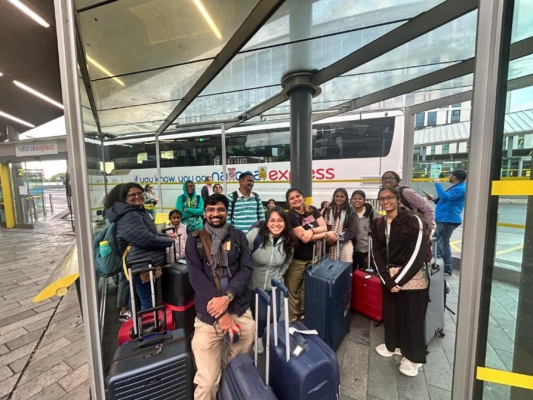
The CAPABLE program commenced its international orientation at Liverpool John Moores University (LJMU) – Centre for the Built Environment (CBE), with an engaging and insightful first day on campus.
The day began with a warm welcome and opening remarks by Dr. Mike Reily, Dean of the School of the Built Environment, LJMU. Dr. Reily extended his support to the participants and highlighted the significance of global academic collaborations in shaping sustainable and inclusive futures within the built environment. His address set the tone for a week of knowledge exchange, innovation, and mutual learning.
Demonstration of Spot Dog Scanner by Dr. Layth Kraidi
This was followed by a captivating demonstration by Dr. Layth Kraidi, who showcased the cutting-edge capabilities of the Spot Dog Scanner. The robotic system, developed for advanced scanning and site analysis, impressed the Indian students and faculty with its potential applications in building documentation, digital surveying, and construction automation. The demonstration provided participants with a glimpse into the future of intelligent construction technologies and how they intersect with environmental and architectural research.
The day marked an inspiring start to the CAPABLE orientation program, setting a strong foundation for the upcoming sessions and collaborations.
Day 2
Maritime Institute Visit
Workshop 1: Through Life Management of Buildings Part 1
RIBA plan of work by Dr. Mohan Siriwardena
The first workshop under the CAPABLE orientation program at LJMU delved into the theme ‘Through Life Management of Buildings – Part 1’, offering students a multi-faceted perspective on sustainability, digital tools, and long-term thinking in the built environment.
The session began with an insightful introduction to the RIBA Plan of Work by Dr. Mohan Siriwardena, who outlined the structured stages of a building’s lifecycle — from strategic definition to in-use set by the RIBA in UK. His talk highlighted the chronology of how the system is continually evolving, and how a systematic approach ensures efficiency, accountability, and sustainability throughout the project timeline.
Life Cycle Assessment – One click by Mr James Kartwell
Following this, Mr. James Kartwell presented a practical demonstration of Life Cycle Assessment using One Click LCA, a powerful tool for quantifying the environmental impact of construction materials and design decisions. The hands-on session emphasized the importance of integrating LCA early in the design process to make data-driven, environmentally responsible choices.
Maritime Simulator by Dr. Abdul Khalique
Participants then explored an immersive experience with the Maritime Simulator, guided by Dr. Abdul Khalique. The simulator, typically used in marine and infrastructure training, showcased the crossover potential of simulation technology in urban and architectural planning—especially in understanding spatial navigation, logistics, and safety scenarios.
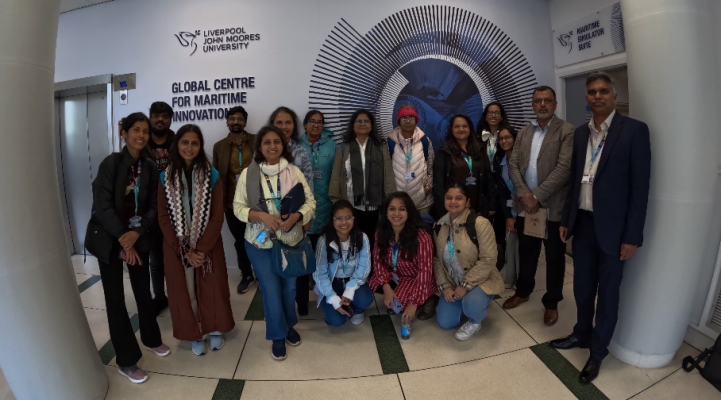
Library resources for research – Pauline Smith
The workshop concluded with a session on Library Resources for Research led by Pauline Smith, who introduced participants to LJMU’s extensive digital and physical research collections. This session equipped participants with the tools and strategies needed to enhance the quality and scope of their academic investigations.
Overall, Workshop 1 offered a rich blend of theory, technology, and practical tools for managing buildings effectively across their entire lifespan.
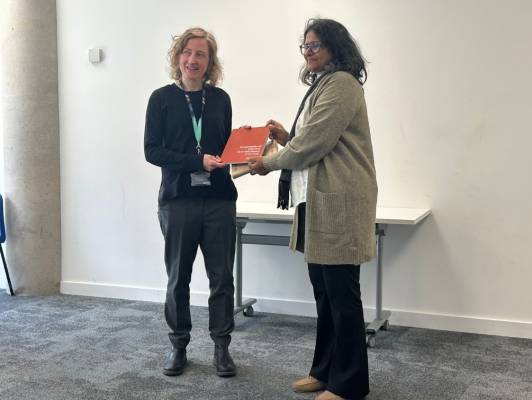
Day 3
Workshop 2: Through Life Management of Buildings Part 2
BIM Design – Dr. Anupa Manewa
Workshop 2 of the CAPABLE orientation program at LJMU continued to build on the theme of ‘Through Life Management of Buildings’, focusing on advanced digital tools and integrated project strategies essential for managing the full lifecycle of a building.
The day began with a session on BIM Design and Introduction to Revit Software led by Dr. Anupa Manewa. Participants were introduced to the fundamentals of Building Information Modelling (BIM) and its practical application using Revit software. Dr. Manewa emphasized the importance of data-driven design, interdisciplinary collaboration, and real-time coordination, empowering participants with tools for smarter decision-making throughout the building process.
Cost planning and Estimation- Dr. Mohan Siriwardena
Next, Dr. Mohan Siriwardena delivered an insightful lecture on Cost Planning and Estimation, based on cases from the United Kingdom. He explained the principles of budgeting in the early stages of a project, methods for estimating material and labor costs, and how cost control aligns with the long-term performance of a building. The session underscored how accurate financial planning can lead to more resilient and economically viable projects.
Project Programme and Cashflow forecast - Dr. Anupa Manewa
Dr. Anupa Manewa returned to lead a session on Project Programming and Cashflow Forecasting, guiding participants through the process of linking project timelines with financial flow. She illustrated how effective scheduling and cashflow analysis are vital for managing risk, allocating resources, and ensuring timely delivery without financial overruns.
Digital Studio Tour – Mr. John Germain
The day concluded with an engaging Digital Studio Tour led by Mr. John Germain, offering participants an inside look at LJMU’s cutting-edge digital facilities. The tour featured advanced digital fabrication labs, virtual design studios, and collaborative environments that support innovation in architecture, engineering, and the built environment.
Workshop 2 provided a comprehensive understanding of how digital integration, financial planning, and technological infrastructure collectively shape the future of sustainable and intelligent building practices.
Day 4,5,6
Students use Library Resources and work on Research Paper
A total of 6 + 1 Research papers submitted to the International Conference – CIOB in Sri Lanka
Day 7
Workshop 3: Through Life Management of Buildings Part 3
Integrating Circular Economy in Facilities Management – Prof. Champika Liyanage
Workshop 3 of the CAPABLE Orientation Program at LJMU marked the culmination of the ‘Through Life Management of Buildings’ series, focusing on sustainability and systems integration within the built environment.
The workshop commenced with an impactful session on Integrating Circular Economy in Facilities Management by Prof. Champika Liyanage, who discussed how circular principles—such as reuse, recycling, and life cycle thinking—can be embedded into the long-term operation and maintenance of buildings. Her session emphasized the shift from linear models to sustainable management practices that reduce waste and extend the usable life of building assets.
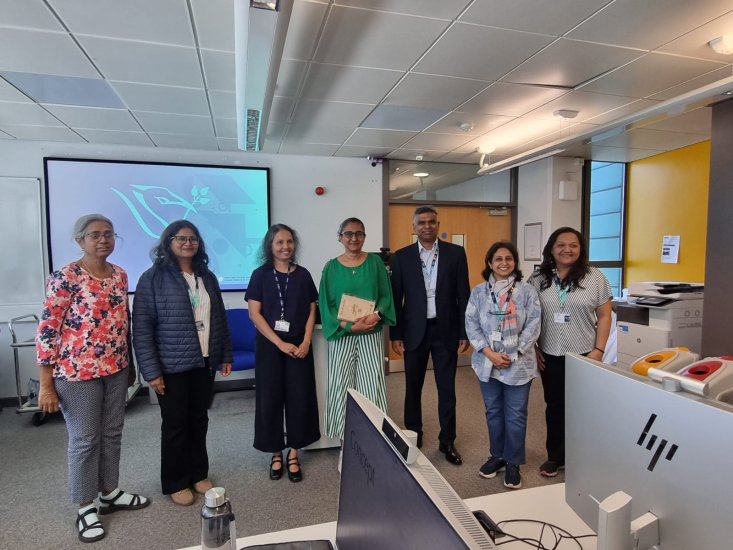
Electrical Systems – Dr. Lauri Brady
This was followed by a technical session on Electrical Systems delivered by Dr. Lauri Brady. The presentation offered participants insights into the design, planning, and operational considerations of electrical installations in buildings. Dr. Brady addressed energy efficiency, safety standards, and the integration of renewable technologies—an essential foundation for sustainable infrastructure.
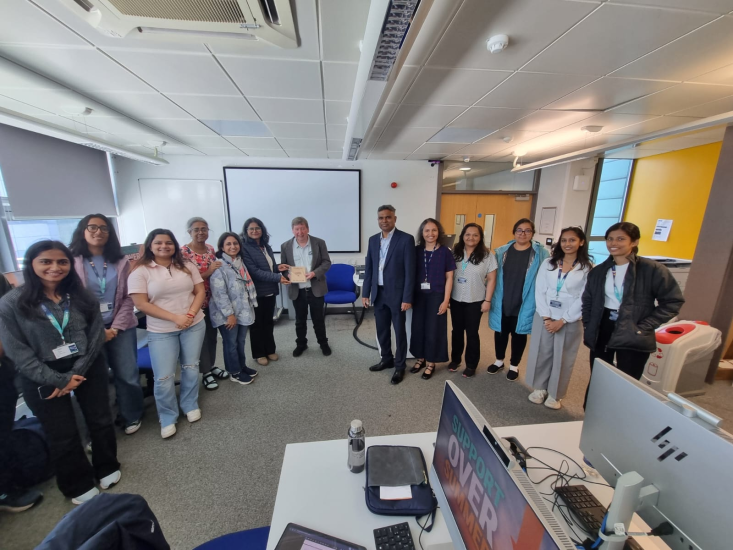
Digital Technologies in Built Environment- Dr. Neema Opiyo
In the next session, Dr. Neema Opiyo explored Digital Technologies in the Built Environment, showcasing the growing role of smart systems, data analytics, and IoT (Internet of Things) in contemporary architecture and urban management. The talk illustrated how digital tools are enabling proactive maintenance, occupant comfort, and energy optimization in real time.
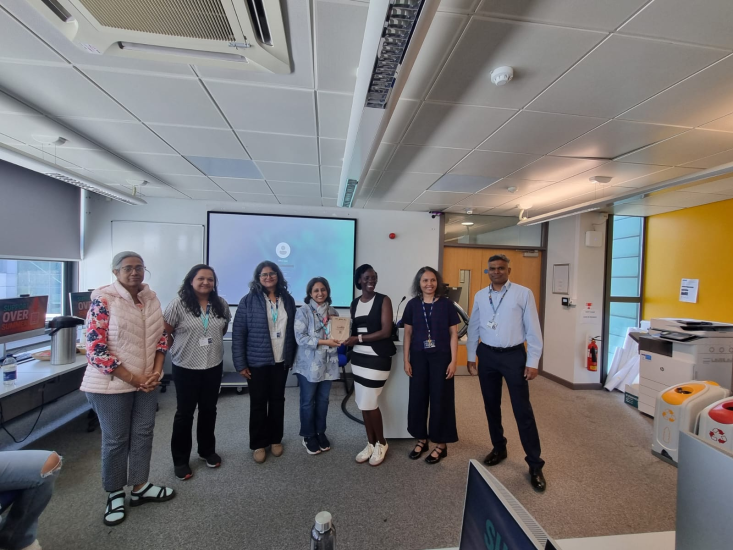
Visit to Immersive Lab – Dr. Onur Dursun
The day concluded with an exciting Visit to the Immersive Lab led by Dr. Onur Dursun, where participants experienced virtual reality (VR) and augmented reality (AR) applications used in design simulation, stakeholder engagement, and spatial analysis. The lab tour demonstrated how immersive technologies are transforming the way architects, planners, and engineers conceptualize and communicate their ideas.
Workshop 3 successfully highlighted the importance of sustainable, systemic, and digital approaches to managing buildings across their life cycle—equipping CAPABLE participants with future-ready insights and practical knowledge.
Day 8
Workshop 4: Research Methodology Part 1
Structured Literature Review – Dr. Anupa Manewa
Workshop 4 of the CAPABLE Orientation Program at LJMU introduced participants to the foundational tools and approaches essential for academic and applied research in the built environment. The session focused on equipping participants with robust methodologies to guide their future investigations and evidence-based practice.
The day began with an enlightening session on Structured Literature Review by Dr. Anupa Manewa, who introduced participants to systematic strategies for sourcing, evaluating, and synthesizing existing research. She emphasized the importance of critical analysis, identifying research gaps, and organizing findings to inform a strong theoretical framework for any research study.
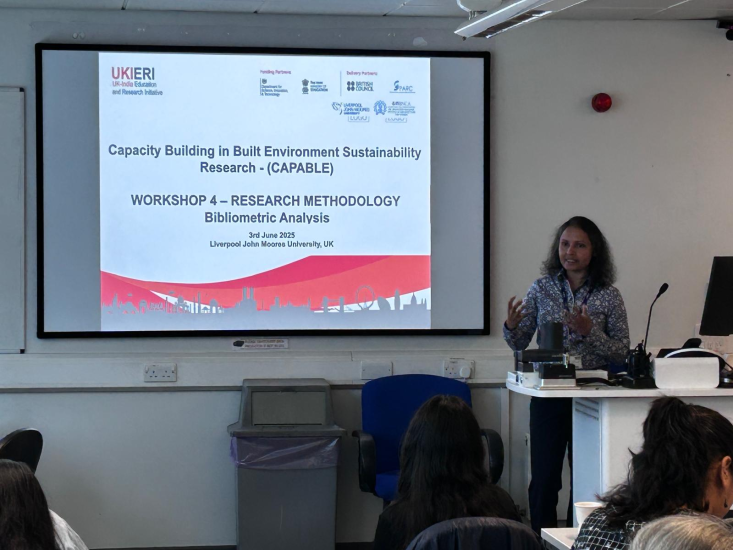
Design Science Approach – Dr. Chamara Panakaduwa
This was followed by Dr. Chamara Panakaduwa’s session on the Design Science Approach. He illustrated how this methodology bridges theory and practice by producing innovative artefacts—such as models, systems, or frameworks—that solve real-world problems. Participants learned how design science can be particularly relevant for built environment research where creative solutions must be both practical and evidence based.
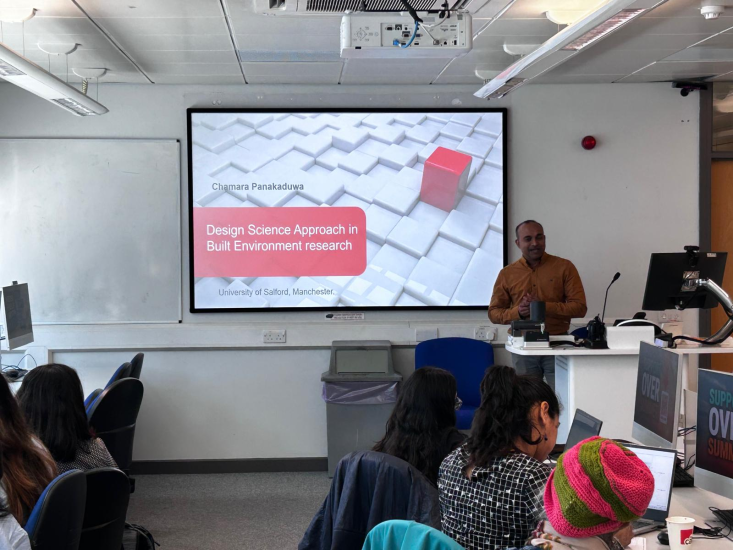
Experimental Research – Dr. Lacopo Carnacian
Dr. Lacopo Carnacian then led a session on Experimental Research, highlighting the role of controlled testing and empirical validation in architectural and engineering investigations. His session provided examples of experimental setups, variable testing, and data analysis methods that are vital in developing credible, reproducible research outcomes.
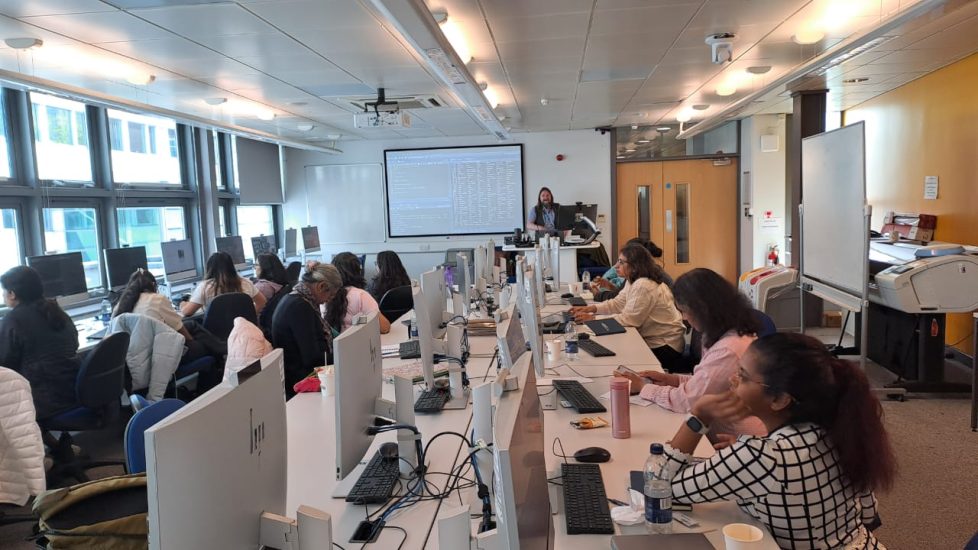
Visit to material lab – Prof. Hassan Al Nageim
The workshop concluded with a hands-on Visit to the Materials Lab, guided by Prof. Hassan Al Nageim. Participants toured the advanced materials testing facilities and were introduced to the processes used to evaluate building materials for strength, durability, sustainability, and performance. The visit offered a tangible connection between research methodologies and real-world application, particularly in materials innovation.
Workshop 4 provided a comprehensive introduction to research methodology, blending theoretical insight with practical exposure. It laid a strong foundation for CAPABLE participants as they prepare to undertake rigorous, impactful research within the built environment.
Day 9
Workshop 5: Research Methodology Part 2
Life Cycle Costing in Construction – Dr Jason Challender
Capex- Opex Database-Dr Anupa Manewa
Interviews as data search tool- Dr Mohan Siriwardena
The 9th day of the training started with a lecture on Life Cycle Costing in Construction by Dr. Jason Challender. He introduced the students to the concepts through real world examples and its use in practice.
This was followed by a session conducted by Dr. Anupa where she demonstrated the use and availability of various databases available in the UK for costing references which are used by the quantity surveyors to prepare a financial feasibility report.
Dr. Mohan later explained how interviews are used as a data search tool specially when data bases might not have the relevant data or the data needs to be collated with on field conditions
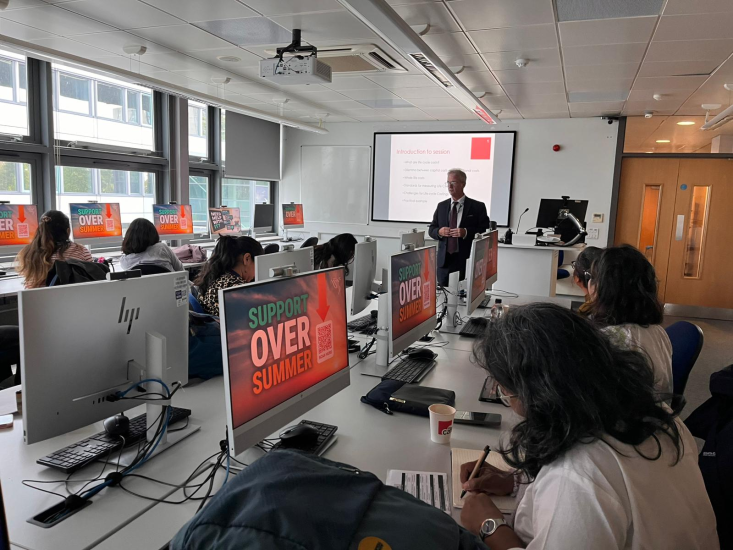
Day 10
Workshop 6: Research Methodology Part 3
Data Analysis by Dr Tom Goddal- Nvivo, R studio, AIfor quantitative research
The workshop conducted by Dr. Tom Goodall was a hands-on training of the qualitative analysis software NVIVO. Dr. Tom introduced the capabilities of the software, how it can be effectively used for qualitative data analysis and how the analysis needs to be presented. He also talked about the integration of R studio with NVIVO for creating scripts appropriate for the specific data as per the researcher’s hypothesis.
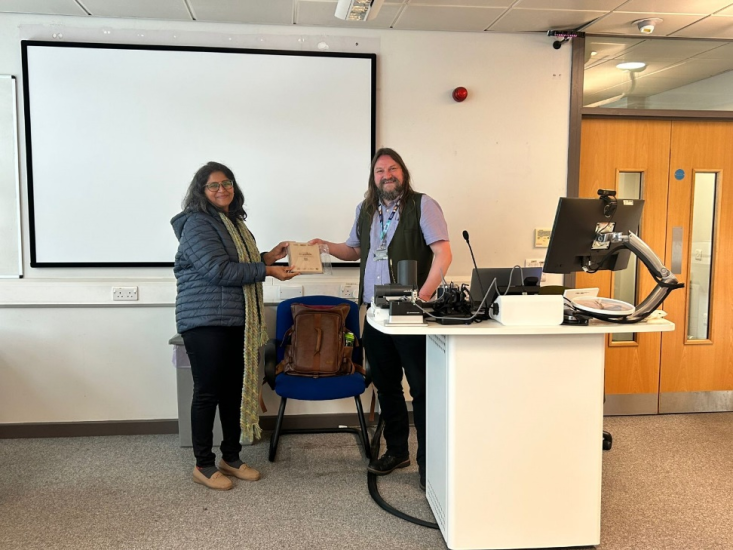
Day 11
Visit to the department of Art and Architecture, LJMU
Day 11 of the training was a visit of the faculty and students to LJMU’s department of Art and Architecture. Dr. Ian Wroot, Dean/Head of the institute welcomed all and explained the philosophy and working of the school. We then visited the studios of undergraduate and master’s programmes where the students could see the exhibited work created in the respective studios.
Post lunch a site visit was arranged at the SPINE building, one of the first building in UK achieving Platinum WELL standard Certification. The visit was conducted by its architect, Ar. Robert Hopkins where he explained various features of the building and what made it to achieve the certifications. It majorly houses the offices of the Royal College of Physicians.
Day 12
Visit to Zaha Hadid Architects Office, London
As a part of the training a visit was arranged by LJMU to the office of Zaha Hadid, a renowned architect known for her fluid and unconventional architectural vocabulary. Ashley from and …….name from ZHA gave a short presentation on some of the projects closely related to the theme of circular economy and construction. The various works of the office as well as the labs were also visited by the students and faculty.













